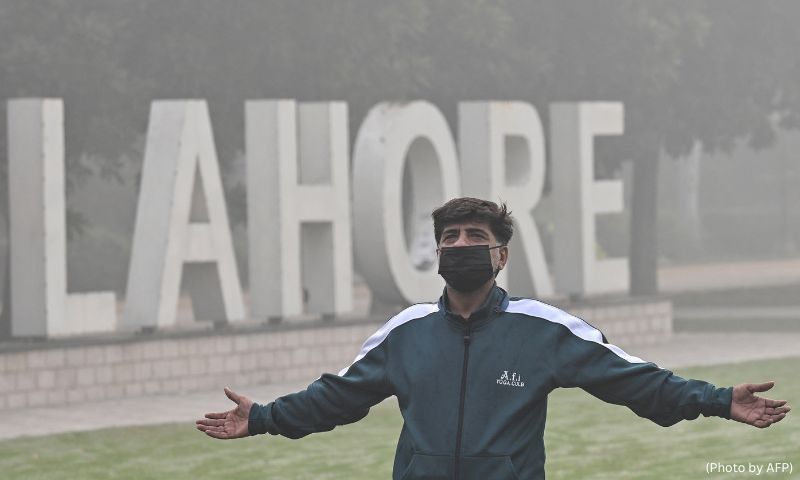By Waqar Bhatti
ISLAMABAD: In the choking fog that drapes Punjab’s cities each winter, an invisible killer is at work. The dense, toxic smog, thick as morning mist, penetrates homes, lungs, and lives with a lethal mix of gases and particles. For the people of Lahore, Faisalabad and many other cities of Punjab, the air itself has turned into a slow-acting poison, bringing with it an alarming surge in heart attacks, strokes, and even suicides.
Medical experts now warn that this year’s smog season could be the deadliest yet, as the fragile health infrastructure strains under the weight of the pollution-fueled crisis. Citing a recent World Heart Federation report, Pakistan’s leading cardiologists, neurologists, and psychiatrists are calling for urgent intervention to prevent a wave of premature deaths.
“A volcano of non-communicable diseases (NCDs) is about to erupt,’ warns Prof. Javed Akram, a renowned healthcare professional and former caretaker health minister of Punjab. In every breath taken by Punjab’s residents, he says, lurks the threat of chronic illness and psychological despair.
He explains that local research and global studies link pollutants like particulate matter and toxic gases to severe health issues, including heart attacks, strokes, cancers, liver and kidney failure, and even rising suicide rates.
“The pollution is affecting everyone—from unborn children to young adults and the elderly,” he added, cautioning that exposure to these toxins could lead to the birth of children with developmental delays or neurological impairments.
Prof. Akram also cites studies showing smog’s link to mental health disorders, such as depression and anxiety, which can, in severe cases, result in suicidal thoughts. He notes that some people in Western countries have relocated from areas where dense smog obscures sunlight for weeks, as the prolonged lack of light worsens mental health.
Similar concerns have been raised by cardiologists who gathered in Lahore last week for the 53rd Annual Cardiocon of the Pakistan Cardiac Society, where air pollution and smog were major topics of discussion.
Citing the World Heart Report 2024, Dr. Khawar Kazmi, an esteemed cardiologist, highlighted these issues, particularly regarding heart health. “Air pollution is as dangerous as any chronic illness. Each winter, hospitals see a marked rise in cardiovascular emergencies directly linked to poor air quality,” he observed.
Particulate matter (PM2.5 and PM10), ground-level ozone (O₃), nitrogen dioxide (NO₂), and sulfur dioxide (SO₂) are especially dangerous as they can penetrate the respiratory system, cause inflammation, and enter the bloodstream. This inflammation accelerates heart disease, potentially resulting in heart attacks or strokes, especially in high-risk areas like Lahore where pollution levels remain high during winter.
Supporting Dr. Kazmi’s view, neurologist Prof. Wasey Shakir from Aga Khan University attributes rising stroke cases to poor air quality, noting that pollution has become a significant cause of stroke in Pakistan. “With each breath, people in smog-hit areas are inhaling a dangerous mix of gases and particulate matter that inflames blood vessels, raising the risk of both ischemic and hemorrhagic strokes,” he explained.
READ ALSO: Pakistan’s Record Smog Triggers Anguish, Anxiety
According to Prof. Wasey, residents of Lahore and other smog-hit cities in Punjab are inhaling hazardous pollutants daily, comparable to smoking 20-25 cigarettes each day. These pollutants, including PM2.5, NO₂, and SO₂, are extremely harmful to cardiovascular health and significantly increase the risk of both types of strokes.
The renowned neurologist also highlighted that during the COVID-19 lockdown, when pollution levels temporarily decreased, Pakistan saw a noticeable reduction in stroke cases and other NCDs, underscoring the direct impact of cleaner air on public health.
“There is an urgent need for Pakistan to strengthen environmental protection measures and improve air quality monitoring. These actions are essential to protect against strokes and other neurodegenerative diseases linked to long-term exposure to polluted air, such as Parkinson’s and developmental disorders in children,” he maintained.
On mental health, Prof. Iqbal Afridi, a senior psychiatrist and former President of the Pakistan Psychiatric Society, links prolonged exposure to polluted air with psychological distress, cognitive decline, and increased suicide rates.
Citing studies from China and other countries, he explains that pollutants like NO₂ and PM2.5 can penetrate the brain, causing neuroinflammation and hormonal disruptions that lead to conditions such as depression, anxiety, and even psychosis.
“Exposure to persistent smog and pollution alters mental states and impairs cognitive functions, sometimes driving individuals to despair and even suicide,” he said.
Other health experts highlight that the World Heart Federation report emphasizes the severe toll of air pollution on global health, with nearly 70% of pollution-related deaths linked to cardiovascular diseases. Punjab’s worsening air quality is a grave concern, as annual smog events pose a direct threat to millions. In Lahore alone, air quality index (AQI) readings often exceed safe limits during winter, creating a toxic environment with far-reaching health risks.
According to Dr. Abdur Rasheed, an environmentalist, Punjab’s smog results from a mix of vehicular emissions, industrial discharge, and seasonal crop burning, which combine to form a hazardous blanket of pollutants. Fine particulate matter and gases like CO, SO₂, and NO₂ collectively cause oxidative stress and inflammation, affecting the heart, lungs, and brain.
The economic impact of air pollution is equally concerning, with the World Bank estimating the global cost of pollution-related health issues at $8.1 trillion, including lost productivity and healthcare costs. Punjab’s situation highlights the urgent need for government action, as pollution not only endangers public health but also strains economic resources.
Medical experts are urging the government to adopt stricter air quality regulations, similar to those implemented in China and other countries where emissions have been controlled to protect public health. “We must consider solutions adopted by other nations to reduce air pollution, or we risk an explosion of health issues and a breakdown of our healthcare system,” Dr. Akram warned.
As the smog season intensifies, health professionals call for urgent public health measures and stronger environmental policies to protect citizens. Without immediate intervention, Pakistan could face a severe health crisis, affecting not only physical health but also the mental well-being of millions in regions like Punjab, where the impacts of pollution are both visible and dangerously pervasive.
























